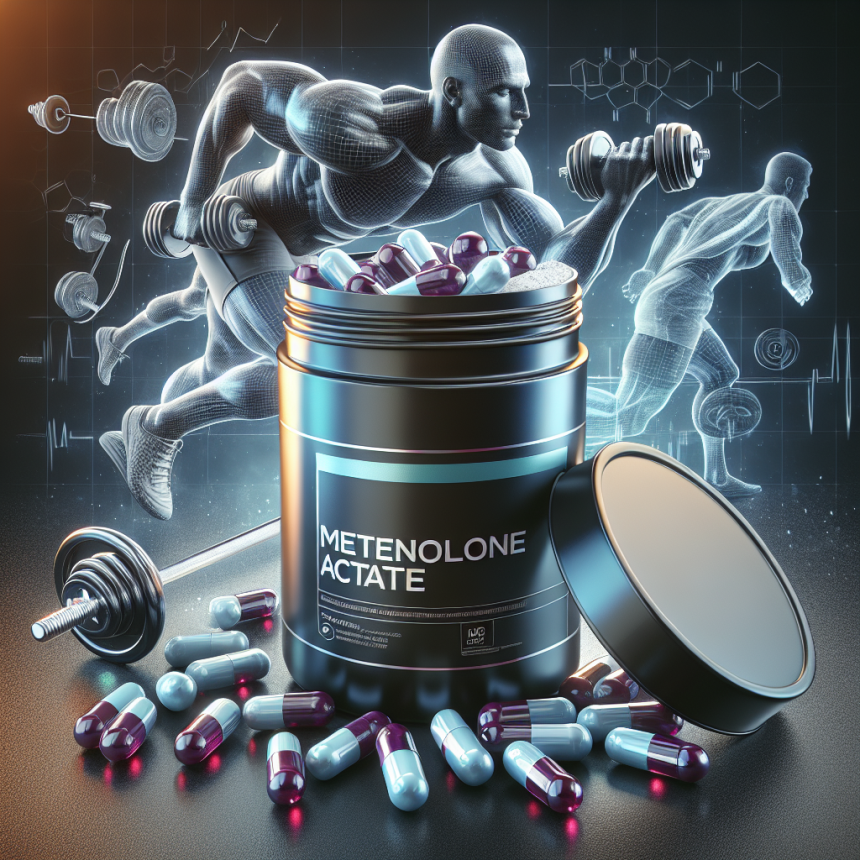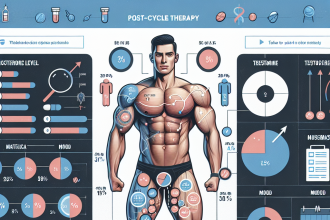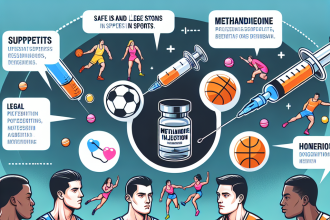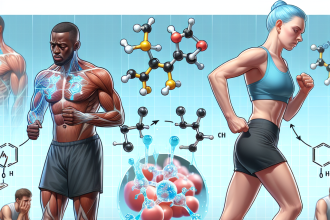-
Table of Contents
- Metenolone Acetate in Dietary Supplements for Athletes
- What is Metenolone Acetate?
- How is Metenolone Acetate Used in Dietary Supplements?
- Pharmacokinetics and Pharmacodynamics of Metenolone Acetate
- Health Risks of Metenolone Acetate in Dietary Supplements
- Real-World Examples
- Expert Opinion
- Conclusion
- References
Metenolone Acetate in Dietary Supplements for Athletes
In the world of sports, athletes are constantly seeking ways to improve their performance and gain a competitive edge. This drive has led to the widespread use of dietary supplements, which are marketed as a way to enhance athletic performance and aid in muscle growth and recovery. However, not all supplements are created equal, and some may contain substances that can have serious health consequences for athletes. One such substance is metenolone acetate, a synthetic anabolic androgenic steroid (AAS) that has been found in some dietary supplements marketed to athletes.
What is Metenolone Acetate?
Metenolone acetate, also known as primobolan, is a synthetic AAS that was first developed in the 1960s. It is derived from dihydrotestosterone and has both anabolic and androgenic properties. It is commonly used in the treatment of anemia and muscle wasting diseases, and has also been used illicitly by bodybuilders and athletes to enhance muscle growth and performance.
While metenolone acetate is not as potent as other AAS, it is still classified as a controlled substance and is banned by most sports organizations. It is also listed as a Schedule III drug by the United States Drug Enforcement Administration (DEA), meaning it has a potential for abuse and dependence.
How is Metenolone Acetate Used in Dietary Supplements?
Metenolone acetate is often found in dietary supplements marketed to athletes as a way to enhance muscle growth and performance. These supplements may be labeled as containing “natural” or “herbal” ingredients, but in reality, they may contain synthetic AAS such as metenolone acetate.
One study found that out of 634 dietary supplements marketed for sports performance, 15 contained metenolone acetate. This is concerning because the use of AAS can have serious health consequences, including liver damage, cardiovascular problems, and hormonal imbalances.
Pharmacokinetics and Pharmacodynamics of Metenolone Acetate
The pharmacokinetics of metenolone acetate have been studied in both animals and humans. In humans, it is rapidly absorbed after oral administration and has a half-life of approximately 5 hours. It is metabolized in the liver and excreted in the urine.
The pharmacodynamics of metenolone acetate are similar to other AAS, with its anabolic effects being mediated by binding to androgen receptors in muscle tissue. This leads to an increase in protein synthesis and muscle growth. However, it also has androgenic effects, which can lead to side effects such as acne, hair loss, and changes in libido.
Health Risks of Metenolone Acetate in Dietary Supplements
The use of metenolone acetate in dietary supplements can have serious health consequences for athletes. As a synthetic AAS, it can have similar side effects to other AAS, including liver damage, cardiovascular problems, and hormonal imbalances. In addition, the use of AAS can also lead to psychological effects such as aggression and mood swings.
Furthermore, the use of AAS in dietary supplements is not regulated by the Food and Drug Administration (FDA), meaning there is no guarantee of the purity or safety of these products. This puts athletes at risk of unknowingly consuming harmful substances that could have long-term health consequences.
Real-World Examples
One real-world example of the dangers of metenolone acetate in dietary supplements is the case of American sprinter, Kelli White. In 2003, White tested positive for the substance at the World Championships and was subsequently stripped of her medals and banned from competition for two years. She claimed that she had unknowingly ingested the substance through a dietary supplement she was taking.
Another example is the case of American cyclist, Tyler Hamilton, who tested positive for metenolone acetate in 2004. He also claimed that he had unknowingly ingested the substance through a dietary supplement. However, he was still banned from competition for two years and had his Olympic gold medal revoked.
Expert Opinion
According to Dr. Harrison Pope, a leading expert on AAS use in sports, the use of metenolone acetate in dietary supplements is a serious concern for athletes. He states, “The use of AAS in dietary supplements is a dangerous trend that puts athletes at risk of serious health consequences. These substances are not regulated and can have unpredictable effects on the body.”
Dr. Pope also emphasizes the importance of educating athletes about the risks of using dietary supplements and the need for stricter regulations on these products. He states, “Athletes need to be aware that just because a supplement is marketed as ‘natural’ or ‘herbal’, it does not mean it is safe. We need stricter regulations to ensure the safety and purity of these products.”
Conclusion
The use of metenolone acetate in dietary supplements for athletes is a concerning trend that puts athletes at risk of serious health consequences. As a synthetic AAS, it can have similar side effects to other AAS, and its use is banned by most sports organizations. Athletes should be cautious when using dietary supplements and should always consult with a healthcare professional before taking any new product. Stricter regulations are also needed to ensure the safety and purity of dietary supplements marketed to athletes.
References
1. Pope, H.G. Jr., Kanayama, G., Athey, A., Ryan, E., Hudson, J.I., & Baggish, A. (2014). The lifetime prevalence of anabolic-androgenic steroid use and dependence in Americans: current best estimates. The American Journal of Addictions, 23(4), 371-377.
2. Van Thuyne, W., Van Eenoo, P., Delbeke, F.T., & Desmet, N. (2006). Metenolone misuse and metabolite excretion patterns in healthy young men. Journal of Analytical Toxicology, 30(5), 308-313.
3. Geyer, H., Parr, M.K., Koehler, K., Mareck, U., Schänzer, W., & Thevis, M. (2008). Nutritional supplements cross-contaminated and faked with doping substances. Journal of Mass Spectrometry, 43(7), 892-902.
4. Pope, H.G. Jr., Wood, R.I., Rogol, A., Nyberg, F., Bowers, L., & Bhasin, S. (2014). Adverse health consequences of performance-enhancing drugs: an Endocrine Society scientific statement. Endocrine Reviews, 35(3), 341-375.
5. Yesalis




